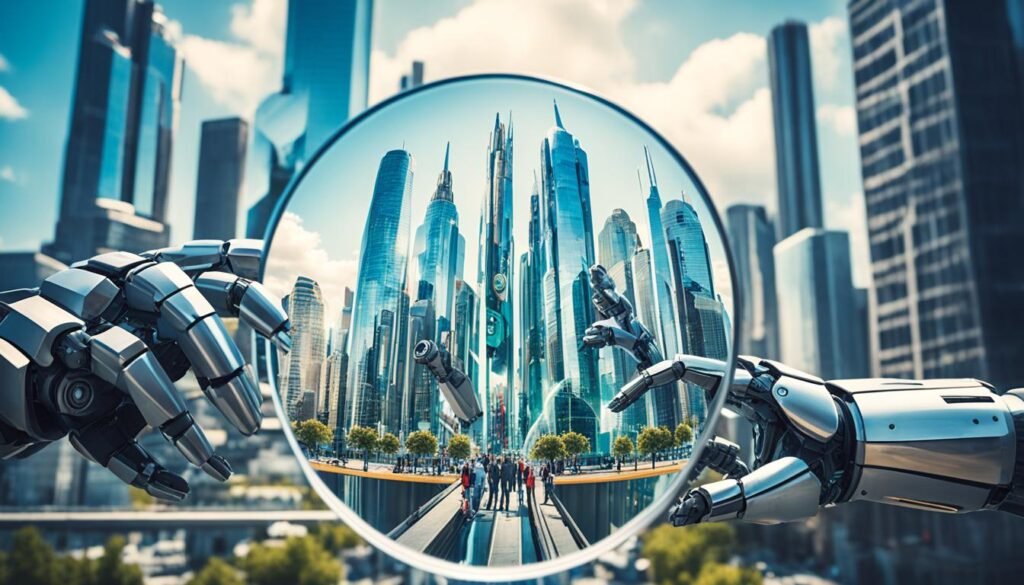AI is becoming a big part of our lives, making it crucial to have strong ethical rules. Big tech companies like IBM, Google, and Meta are working hard on AI ethics. They follow the Asilomar AI Principles, which are 23 guidelines for responsible AI.
About 44% of AI projects face problems with biased or wrong data. This can hurt groups that are not well-represented. We need ethical AI that is fair, open, and accountable. The United Nations made a global agreement on AI ethics in 2022, showing how serious this issue is.
Creating responsible AI is important for both moral and strategic reasons. Training big AI models uses a lot of energy, so making AI more energy-efficient is key. The 2016 report by the National Science and Technology Council highlighted the need to tackle these issues early on.
This article will look at ethical AI principles, who is involved, and how to make AI more responsible. We’ll use real examples to show how to handle AI ethics. You’ll learn how to make sure AI helps everyone, not just a few.
Key Takeaways
- AI ethics are the moral principles that guide the responsible and fair development and use of AI systems.
- Ethical AI practices are crucial to address issues such as algorithmic bias, data privacy, and transparency in AI decision-making.
- Key stakeholders in AI ethics include developers, organizations, policymakers, and the broader public.
- Principles of responsible AI include fairness, transparency, non-maleficence, accountability, and privacy protection.
- Promoting responsible AI practices involves fostering collaboration, prioritizing education, and implementing ethical AI in the design process.
Introduction to AI Ethics
AI is now a big part of our lives, changing how we work and interact. It’s making industries better. But, we need ethical AI more than ever. This means following rules for making and using AI right.
What are AI Ethics?
AI ethics are rules and guidelines. They help make sure AI is safe, kind, and good for the planet. They focus on avoiding bias, protecting user privacy, and reducing risks to the environment and society.
Companies and governments can set these rules. This way, AI helps everyone, not just a few.
Responsible AI is very important. AI can change many areas, like healthcare and driving. We must tackle issues like bias and make AI decisions clear and fair.
| Industry | AI Ethics Considerations |
|---|---|
| Healthcare | Ensuring AI-powered medical diagnoses and treatment recommendations are fair, unbiased, and transparent to build trust with patients. |
| Transportation | Prioritizing safety and ethical decision-making in the development of autonomous vehicles, such as how they should respond in emergency situations. |
By focusing on AI ethics responsibility, we can make sure AI helps society. This means AI works with our values and does good for everyone.
Importance of AI Ethics
AI is becoming a big part of our lives, making AI ethics very important. AI technology is designed to help or replace humans. But, it can also make the same mistakes humans do. This is a big worry, especially for groups that are often left out.
The risks of unethical AI are big. A report by McKinsey says many companies use AI a lot. This fast use of AI means the bad effects could be huge, like losing jobs or breaking privacy rules.
To avoid these problems, we need to add ethics for AI during its making. This way, companies can spot and fix issues early. It helps make AI better and keeps it fair.
| Impact of Unethical AI | Importance of AI Ethics |
|---|---|
| – Job displacement (AI could replace around 300 million full-time jobs, as per a report by Goldman Sachs) | – Proactively identify and address issues before deploying AI systems |
| – Privacy breaches and algorithmic bias | – Ensure AI systems operate within ethical boundaries |
| – Potential 7% increase in the total annual value of global goods and services due to AI | – Lead to extraordinary innovations and qualitative competition in companies |
AI ethics is a global concern. UNESCO and the European Union have made official documents about AI ethics. By focusing on ethical AI, we can make sure AI helps us in good ways.

“When responsible AI is implemented, companies can proactively identify and address issues before deploying AI systems, reducing the occurrence of failures.”
Key Stakeholders in AI Ethics
Creating ethical AI rules needs people from different fields to work together. These include academics, government groups, international organizations, non-profits, and private companies. Each group is crucial for making AI less biased and safer.
Academics like computer science and ethics experts lead in understanding AI’s moral and social sides. They create rules and best practices for responsible AI. Places like the Future of Life Institute and the Alan Turing Institute are key in this area.
Government agencies from countries like the UK, Australia, the EU, Japan, and Canada are also key players. They make sure AI follows the law and respects people’s rights and privacy.
Private companies like Microsoft, Google, and IBM also have big roles. They set their own rules for ethical AI use. These companies work with academics and governments to make industry-wide AI ethics standards.
Dealing with AI ethics needs a team effort from many groups. By working together, these stakeholders can make AI trustworthy and ethical. This way, AI can help everyone without causing harm.
“Responsible AI development requires a collaborative effort among academics, governments, and the private sector to establish ethical principles and guidelines.”
ai ethics responsibility
AI has changed the world fast, touching many areas of life. The need for AI ethics responsibility is now clear. It deals with the tough choices and problems that come with AI. We need to make sure AI is fair, accountable, and clear in how it works to help people and society.
One big worry is AI might make unfair choices because of bias in its training data and algorithms. This could mean decisions based on race, gender, or age. We must work together to make AI fair and include everyone. It’s also key to make sure we can understand how AI makes decisions.
We need to keep an eye on AI and fix any ethical issues as they come up. This means always thinking about how AI affects people and society. Ethical AI practices should be a big part of making AI, not just an add-on.
| AI Ethics Responsibility Principles | Description |
|---|---|
| Fairness | Ensuring AI systems do not discriminate based on protected characteristics like race, gender, or age. |
| Transparency | Providing clear explanations of how AI systems make decisions, ensuring accountability. |
| Non-maleficence | Minimizing potential harms and negative impacts of AI on individuals and society. |
By taking on AI ethics responsibility, we can make the most of AI without hurting anyone. With teamwork, research, and a focus on ethics, we can create a future where AI makes our lives better, safely and fairly.

“The term ‘ethical AI’ can be misleading as it implies a level of moral agency not present in AI systems; human intent drives ethical outcomes, not AI itself.”
– Cansu Canca, Ethics Lead at the Institute for Experiential AI
Principles of Responsible AI
As AI becomes more common and powerful, we need clear rules for its use. There’s no single set of rules everyone agrees on, but some key ideas stand out. These ideas help make AI responsible.
Fairness, Transparency, and Non-maleficence
Fairness, transparency, and non-maleficence are key principles for responsible AI. AI should treat everyone fairly, without bias. It should give equal chances to everyone, no matter who they are.
Being clear about how AI works is also important. Users and stakeholders need to understand AI’s decisions. The last principle is about avoiding harm. AI should be made and used in ways that don’t hurt people or society.
These ideas of fair AI, transparent AI, and non-maleficent AI are the base for principles of responsible AI. They help guide the ethical use of AI technology.
“The AI designer is responsible for tasks such as data drift checks, assessing data for bias, designing AI algorithms, monitoring and alerts optimization, and establishing best practices for insights.”
Following these principles helps make AI trustworthy, accountable, and good for society.
Promoting Responsible AI Practices
As AI use grows, companies must focus on responsible AI practices. They need to make policies that include ethical thoughts from start to finish. This ensures the AI is honest and right from the beginning to its use in the real world.
To make AI responsible, companies should work together across different fields. They should keep teaching and add ethics to AI design. It’s important to have clear rules, protect users’ privacy, and be open about how AI works.
- Encourage cross-functional collaboration between data scientists, ethicists, legal experts, and other stakeholders to address the complexities of implementing responsible AI.
- Prioritize ongoing education and training for all employees involved in AI development, ensuring they understand the importance of best practices for responsible AI.
- Integrate ethical principles, such as fairness, transparency, and non-maleficence, into the design, development, and deployment of AI systems.
- Implement robust governance structures and oversight mechanisms to monitor the performance and impact of AI systems, mitigating potential risks and biases.
- Protect end-user privacy by adhering to data privacy regulations and implementing security measures to safeguard sensitive information.
- Promote transparency by communicating the capabilities and limitations of AI systems, as well as the decision-making processes involved.
By following these responsible AI practices, companies can handle the challenges of AI development and use. This ensures the technology is ethical and good for everyone involved.

“Responsible AI is not just a nice-to-have, but a critical imperative for organizations seeking to harness the power of AI while mitigating potential risks and unintended consequences.”
Responsible AI in Practice
As AI systems grow, it’s key for companies to focus on responsible AI. They should use best practices and responsible AI principles. This way, they can make sure their AI models improve our lives and keep humans in control. Here are some examples of how responsible AI is being used in the real world:
Best Practices and Examples
FICO’s Fair Isaac Score shows what responsible AI looks like. It’s a credit scoring system that’s fair and clear. It uses many factors to judge creditworthiness and prevents bias.
PathAI’s AI-powered diagnostics solutions use responsible AI to help pathologists make accurate, fair diagnoses. They check the data for bias and update their models with feedback from real-world use.
IBM’s Watsonx Orchestrate is another example of responsible AI in action. It helps make hiring fair and inclusive by tackling data bias and explaining AI limits. This AI tool helps companies hire more fairly.
These examples show how responsible AI can make our lives better and build trust in these new technologies. As AI grows, it’s important for companies to focus on ethical use. This way, we can fully benefit from these powerful tools.
Addressing Ethical Challenges
AI is moving fast, bringing up many ethical issues. We need to look at AI bias, privacy, and its effect on the environment. These problems must be solved to make sure AI is used right.
AI bias is a big issue. Studies say AI can be biased because of the data it learns from. For example, self-driving cars might be more likely to hit people with darker skin. To fix this, companies need to check their data and test their AI to find and fix biases.
Privacy is also a big worry. AI uses a lot of personal data, making us think about consent and data safety. To protect privacy, we need strong data rules, good encryption, and to give users control over their data.
AI’s effect on the environment is another big concern. Training and using AI takes a lot of energy, which can harm the planet. We need to make AI more energy-efficient, use less energy, and think about the environment when designing AI.
To solve these problems, we need to work together. We need rules, education, and AI tools to stop bad behavior. By working with tech experts, lawmakers, ethicists, and everyone, we can make sure AI helps us all while respecting fairness, openness, and privacy.
| Ethical Challenge | Mitigation Strategies |
|---|---|
| AI Bias |
|
| Privacy Concerns |
|
| Environmental Impact |
|
By tackling these ethical issues, we can make the most of AI. We can make sure AI is fair, open, and respects privacy. Working together, we can make a future where AI helps everyone and makes life better for all.

“The development of full artificial intelligence could spell the end of the human race… It would take off on its own, and re-design itself at an ever-increasing rate. Humans, who are limited by slow biological evolution, couldn’t compete, and would be superseded.”
– Stephen Hawking, renowned physicist
The Future of Ethical AI
Artificial intelligence (AI) is growing fast and becoming key to businesses. It’s vital to use AI responsibly and ethically. We need strong rules and standards to help develop and use AI right.
A recent survey found 68% think most AI won’t focus on the public good by 2030. This shows we must act now to make AI fair and ethical. We need to follow laws and make decisions that are right for everyone.
The future of ethical AI depends on good AI ethics governance and clear ethical AI regulations. Companies need to think about the risks and challenges of AI. Misuse of AI, like fake media in wars or deepfakes, is a big worry.
Companies must earn trust by using AI responsibly. They should not rely on one person for AI decisions. Instead, they should work together with different experts. This way, they focus on fairness, being open, and doing no harm.
Government rules will be key in making AI ethical. Companies like Rackspace are leading by not using AI for certain tasks. This shows what others should do too.
The future of ethical AI is exciting but tough. By using AI responsibly, companies can make the most of this technology. They can follow principles of fairness, openness, and doing no harm. This will help shape a future where AI helps everyone.
“Implementing ethical AI practices is crucial for companies to avoid reputational risks and build trust with customers.”
Conclusion
As we move forward with artificial intelligence (AI), we face a big question: how to manage machines smarter than us. We must use AI ethics to guide us. This means being open, involving many people, and checking to make sure this tech is used right for everyone.
By following responsible AI practices, we can make the most of this new tech. This means working together, being clear, making sure everyone is included, using data ethically, and always learning and getting better. Companies that focus on AI ethics can gain trust, stay out of legal trouble, and make their workers and customers happier.
The main points on ethical AI are clear: it can stop harm, follow the law, and build trust. But, bad AI can cause bias, invade privacy, and even hurt people. As AI becomes a bigger part of our lives, we must keep it focused on people. We need to put ethical thoughts first in this tech change.
FAQ
What are AI Ethics?
AI ethics are the moral rules that guide how companies make and use AI. They aim for safe, kind, and green AI use.
Why are AI Ethics important?
AI ethics matter because AI can think like us or even better. But, it can also make the same mistakes we do. Having ethics helps avoid these problems.
Who are the key stakeholders in AI Ethics?
Important people in AI ethics are experts, governments, groups that work together, non-profits, and companies. They all help make AI less biased and safer.
What are the key principles of Responsible AI?
Responsible AI follows rules like being fair, clear, kind, and honest. It also means being private, strong, and open to everyone. These rules help make good AI choices.
How can organizations promote Responsible AI Practices?
Companies can support responsible AI by working together, teaching each other, and making ethics part of AI design. They should also watch over AI, protect users’ privacy, and be open.
What are some examples of Responsible AI in Practice?
Good examples of responsible AI are FICO’s Fair Isaac Score, PathAI’s AI for health, and IBM’s Watsonx for hiring fairly.
What are some of the key ethical challenges in AI?
Big issues with AI include bias, privacy, and harming the environment. We can tackle these with rules, learning, and AI tools.
What is the future of Ethical AI?
The future of ethical AI needs strong rules and education. Making AI fair and right is key. Following laws and making smart choices will be crucial.
